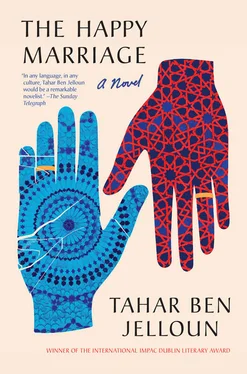“But you’re sacrificing yourself!”
She lowered her gaze to avoid breaking into tears again.
The painter knew that Imane’s departure would affect him deeply. He’d grown attached to that woman, and he would miss her fervent imagination, her soothing charm, and those gifted, healing hands. He knew she’d be very unhappy in Belgium. That fiancé of hers who’d shown up in a flashy car was surely up to no good. He’d seen girls follow their husbands abroad only to discover that they had another family there. At which point they would run back to their parents in tears and wait for a man who truly loved them to show up. Some of them even wound up married to hashish smugglers who used their spouses as mules.
The painter asked Imane to promise that she’d never forget him, that she would come visit him soon and let him know how things were going. Moved, she fell into his arms and nestled her head into his shoulder, and he held her tightly against him. He didn’t want that embrace to end, even though he would have preferred to keep his distance, since he had nothing to offer her. Yet his thoughts were quickly negated by a sudden erection. He was both delighted and disappointed. He didn’t want to make love, especially not to Imane, so he restrained himself and tried to gently push her away, but she pressed herself even more tightly against him. He could feel her warm body, her little breasts pressed against his chest, and smell the scent of her hair. He wanted to speak, but then gave up on it. She was already on top of him, ready to mount him. They got up and she helped him to lie down on the bed, locked the door to his studio, pulled the curtains, switched off the lights, and drew close to him, taking off her robe. She was completely naked, warm and trembling with desire. He didn’t resist. She stroked his belly and then worked her way down to his groin, grabbing his shaft and kissing it, then got on top of him, allowing him to penetrate her slowly, then began moving forward and backward, leaning over him and brushing his face with her long hair. He mostly managed to stay hard, but whenever he felt he was going limp, her lips would make him hard again. When he came, she cried out with pleasure because she’d also climaxed and had been waiting for that moment for a long time.
They lingered for a long time with their bodies pressed against one another. She caressed his face while he thought about the pleasure he’d just rediscovered. Nevertheless, he knew that they would never sleep together again and this was her parting gift. Without a word, Imane stood up, dressed, picked up her belongings, leaned down to him, and gave him a long kiss. He felt her tears stream down and mix with his, which he was trying to conceal.
“Another woman will come to take care of you tomorrow. She’s a nice lady, very sweet and competent. I chose her. Goodbye. I’ll write to you, if you prefer I’ll call you from time to time.”
She left without looking back. He swallowed a sleeping pill and went to bed without dinner. He tried to keep those heavenly perfumes in his lungs to help him persevere down the long road of recovery.
XXIX. Tangiers, September 23, 2003
— I gave you a good home.
— Yes, but it smells of paint. I can’t stand the smell of paint, and your pictures cluttering up the hall, if you don’t rid of that trash I swear I’ll give it to the junkman. I swear I will. Go ahead and eat, and then do the dishes.
— FRITZ LANG, Scarlet Street
Taking his doctor’s advice, the painter left Casablanca behind and headed to Tangiers with the Twins to spend a few restful days at his friend Abdelsalam’s house on the outskirts of Tangiers. It was the end of September, and more than ten months had passed since he’d told his wife he was leaving her.
Whenever it rained in Tangiers, the Chergui winds would join the fray, they would blow and make the hills of the Old Mountain tremble. The winds would continue blowing even after the rains had stopped, shaking even the tallest and sturdiest trees. It was said the winds helped sweep the city clean of diseases and its mosquitoes. Others insisted that it made people crazy, and that madmen needed those winds to get excited, sing, dance, and laugh.
His friend’s villa held steady against the winds, even though its doors and window shutters shook, allowing the coldness of that untimely visitor to seep through the house. The Chergui would leave no stone unturned and stir everything in the city out of the lethargy into which its inhabitants had so happily slipped. Those who loved hot drinks would snuggle into their thick djellabas and sip glasses of mint tea. The fishermen didn’t go out to sea, the fish market was closed, and the bars would fill with people while they waited for the winds to exhaust themselves. When they finally stopped, everything would be still for a while and one could hear the silence, and appreciate it. The storm left a sense of peace and sleepiness in its wake. The painter loved those moments of renewed calm, and he called that kind of silence Mozart-like.
The painter compared his wife to those forces of nature. One moment she would be violent, brutal, and menacing, and then miraculously become suddenly sweet, calm and kind. Imane’s departure in February had plunged the painter into a strange sort of melancholy. “She was my last wife” he told himself, convinced that in his enfeebled state, he was unlikely to ever meet anyone else again. He hadn’t felt good since then. From a physical point of view, he’d begun feeling heavy again, just like in the early days of his convalescence. His heart rate slowed. He’d entered a decline.
While looking out at the sea, the painter asked himself for the umpteenth time how he could free himself from his wife’s clutches since she was refusing to allow the divorce to happen and had so far outwitted all of his lawyer’s stratagems. He’d tried to come up with ways to force his wife to accept their separation, but he now realized that she would never give up. He would have to radically change his tactics, but he’d run out of ideas save to sink into an unbreakable silence. Whenever his friends came to see him in Casablanca, he would insist on seeing them by himself. Otherwise, if his wife were there, he wouldn’t say a word; but when he was on his own, he would be able to speak again and explain to them that he was under house arrest. Nobody believed him. His friends would instead try to put his mind at ease. “Why would you think such a thing? Why don’t you focus on the fact that you can have her beside you, she’s so devoted to you. Look at how thin and tired she’d become. How will you manage on your own? You don’t realize in what bad a shape you’re in.” Whereas he actually realized what shape he was in and merely dreamed of living on his own, surrounded by people who valued his company and who actually helped him. But he had neither the strength nor the desire to tell his friends about his conflicts with his wife, so he would hang his head and force a weak smile, as though he agreed with them.
His wife would eavesdrop on them behind the closed door. Whenever she’d decided the right moment had come, she would burst in with a tray of refreshments, keeping her gaze fixed on the floor as though to show how the situation weighed so heavily on her shoulders. Sometimes she would even mop a tear from her cheeks. Some of his friends would take pity on her, while others would rejoice at her presence and praise her, saying that she’d sacrificed her youth and spent all her time looking after an impotent husband, a moody invalid, an artist who was impossible to live with and a man who thought that the mere shadow of his presence would somehow suffice to keep his wife happy.
Ever since he’d filed for divorce, his wife had been both strong and frail, because she did honestly cry whenever she was alone in their room and far away from him. She knew that her life had been a failure, a waste. She lost weight, neglected herself, and almost never left the house. Only Lalla, her guru, would come visit her, encouraging her to resist her husband’s efforts at all costs, persuading her to punish him for all the suffering he’d caused her over the years and for the fact he wanted to leave her. Lalla’s eyes had a pernicious glimmer to them, as though she herself had been a victim. Lalla had told her about a new sorcerer who’d arrived from Senegal, a young man who used herbs that were unknown in Morocco. This sorcerer was so successful that one had to wait several days before having the chance to consult him.
Читать дальше












